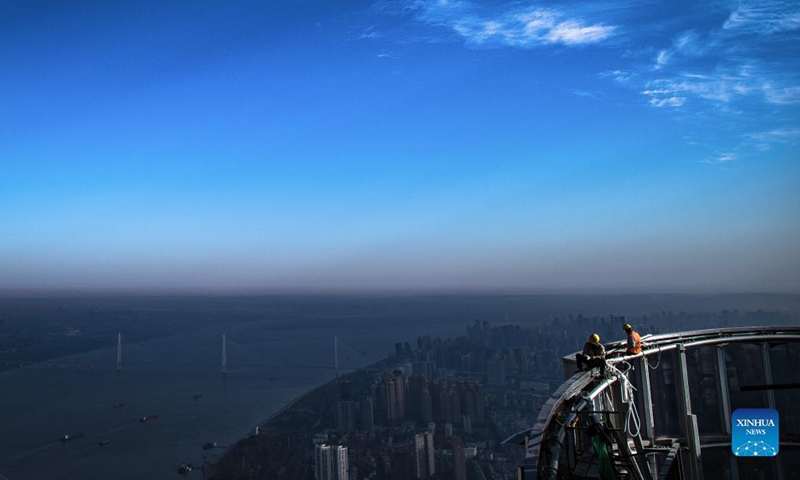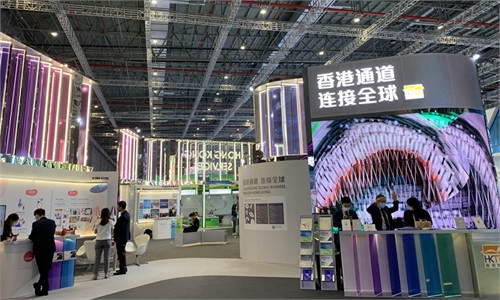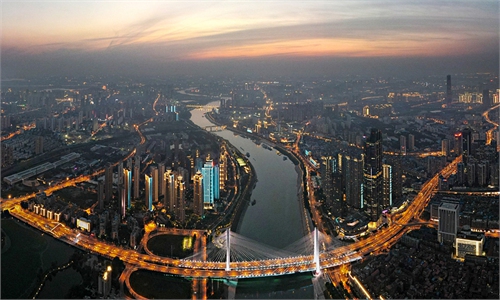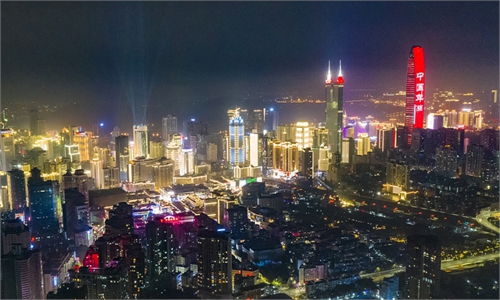
Photo taken on Nov. 15, 2021 shows the construction site of Greenland Center in Wuhan, central China's Hubei Province. Construction on Wuhan Greenland Center, a skyscraper project, has come to the final stage. Photo: Xinhua
Hong Kong Special Administrative Region (HKSAR) Chief Executive Carrie Lam's visit to Wuhan, Central China's Hubei Province, is set to open up new opportunities for the global financial center, which is increasingly seeking enhanced communication and cooperation with various regions on the Chinese mainland.
The chief executive left Hong Kong for Wuhan on Sunday, and she is scheduled to attend the first meeting on cooperation between the HKSAR and Hubei on Monday, according to the HKSAR government's news portal.
Lam's trip will involve the establishment of a high-level cooperation mechanism with Hubei Province, making it the first province in Central China to establish such a cooperation mechanism with the HKSAR.
Accompanying Lam are four senior HKSAR officials, including Chief Secretary for Administration John Lee Ka-chiu and Secretary for Innovation and Technology Alfred Sit Wing-hang.
The meeting in Hubei follows a string of meetings between top HKSAR officials with mainland officials, including those from Shenzhen, Shanghai and Southwest China's Sichuan Province since end-August.
The series of moves indicates that the HKSAR is seeking a closer bond with the Chinese mainland market, exploring more development opportunities in the central and western areas, as Hong Kong businessmen have mainly focused on the Pearl River Delta and Yangtze River Delta previously, Liang Haiming, dean of the Belt and Road Institute at Hainan University, told the Global Times on Sunday.
The HKSAR will increase interconnection, sharing, co-construction and win-win cooperation with these regions in the fields of finance, economy and trade, culture and education, Liang said.
Strengthened cooperation with the mainland market will also attract more mainland firms to list, finance and issue bonds in the Hong Kong market, Liang said. "Then, international investors will have more confidence in Hong Kong's future business environment, so this will attract more global investors to invest there."
As the country gives shape to a new development pattern where the domestic and international dual circulation model is the backbone, the HKSAR hopes to better integrate into the overall development of the country, according to Lam, who shared her hopes that cooperation between Hubei and Hong Kong can be pushed to a new level to mutually benefit people from both regions.
The business ties between Hubei and Hong Kong has been close. Taking 2019 as an example, the total value of goods imported from Hubei to Hong Kong was 23 billion yuan ($3.6 billion) and that exports from Hong Kong to Hubei reached 130 million yuan ($20.33 million), according to a report by the HRSAR government on November 14.
Hong Kong businesses have extensively invested in Hubei in fields ranging from power generation, new materials, and energy conservation and environmental protection, to auto parts.
Investment has seen an increasing trend this year. The Chinese mainland's use of capital from the HKSAR hit $109.15 billion from January to October, up 30 percent year-on-year, and investment opportunities will further increase, an official from the Ministry of Commerce said on November 24.
Since the beginning of 2021, trade between the mainland and the HKSAR has achieved rapid growth despite the adverse effects of the epidemic. From January to October, total trade hit $285.95 billion, a year-on-year increase of 33.5 percent.
Shored up by these factors, GDP growth in the HKSAR in 2021 will likely approach 6.5 percent, HKSAR Financial Secretary Paul Chan Mo-po said on October 31.
Experts noted that the resumption of quarantine-free travel between the mainland and the HKSAR is also the central government's "special concern."
Only through the resumption of quarantine-free travel and a great increase in the exchanges of personnel, capital and trade can there be a large improvement in the job market in Hong Kong. This will further reduce the unemployment rate and inject more vitality into Hong Kong's economic development, Liang said.



